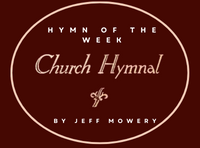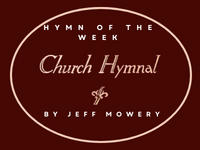At Calvary
“Years I spent in vanity and pride, Caring not my Lord was crucified,
Knowing not it was for me He died on Calvary.
Chorus
Mercy there was great, and grace was free;
Pardon there was multiplied to me;
There my burdened soul found liberty at Calvary.
By God’s Word at last my sin I learned; Then I trembled at the law I’d spurned,
Till my guilty soul imploring turned to Calvary.
Now I’ve given to Jesus everything, Now I gladly own Him as my King,
Now my raptured soul can only sing of Calvary!
Oh, the love that drew salvation’s plan! Oh, the grace that brought it down to man!
Oh, the mighty gulf that God did span at Calvary!”
Over the next couple of weeks as we transition from one President to another, there is going to be a word that will dominate the news before the inauguration. That word is “Pardon.” We will hear various stories about who might be pardoned, what crimes that person committed, who does or doesn’t deserve to be pardoned, how they have changed their and we will even hear about those people former Presidents have pardoned. I am not going to dive into those political discussions about the rightness and wrongness of pardons. However, the word “pardon” is used in this particular hymn, and does cause me to think about some of those “pardon” questions that will be asked by the media.
- Who should be pardoned? One of my favorite words in the Bible may seem a little odd to you, but I think it is a powerful one. That word is “whosoever.” In one of the most well-known Scriptures, John 3:16, Jesus uses “whosoever.” When President’s pardon, they are typically very selective. They tend to base their pardon on who the person is, what party they belong to, how much money they have given or will give. God, however, is no respecter of persons. His Grace is for “whosoever will.”
- Did I deserve to be pardoned? What a poignant question? From the perspective of a Holy God, none of us deserved to be pardoned. “It is by grace you have been saved, not of works, lest any man should boast.” If we are honest with ourselves, we recognize that we are sinners saved by grace. There are also others in need of salvation in the world that we may not like or agree with and maybe we don’t think they deserve to be “pardoned”, but they are no less deserving of His grace.
- How would I feel if all of my sins were part of the public discussion and debate? This is probably the question that hits closest to home. Imagine your sins being broadcast on Fox News or CNN 24 hours a day. Everyone would know what you did. The pardon we receive from God does not require a public disclosure of all our sins, weaknesses, and faults. In Psalms 103:10-12 the Bible says, “He does not treat us as our sins deserve or repay us according to our iniquities. For as high as the heavens are above the earth, so great is his love for those who fear him; as far as the east is from the west, so far has he removed our transgressions from us.”
There is also a phrase in this song that is important that I did want to briefly comment on. In the chorus, the song states “Mercy there was great, and grace was free.” From one perspective, His grace was not “free.” It was very costly. God gave His only Son to be sacrificed for our sins. What a tremendous price that was paid for grace to be poured out to you and me. But thankfully, we don’t have to earn this grace. We don’t have to climb a mountain, pray 6 times a day, or do other ritualistic things. We accept this “free” gift of grace.
So as you hear stories about “pardons” over the next couple of weeks. Feel free to exercise your American right to criticize the “rightness” of those decisions. But more importantly, take time to think about your sins being pardoned. Think about how God’s pardon has changed you. You have been transformed from death to life. From eternal damnation to an eternal paradise. Take time to Read Matthew 18:21-35 – “The Parable of the Unmerciful Servant” and be reminded of how a forgiven, or pardoned, person should respond to others.

